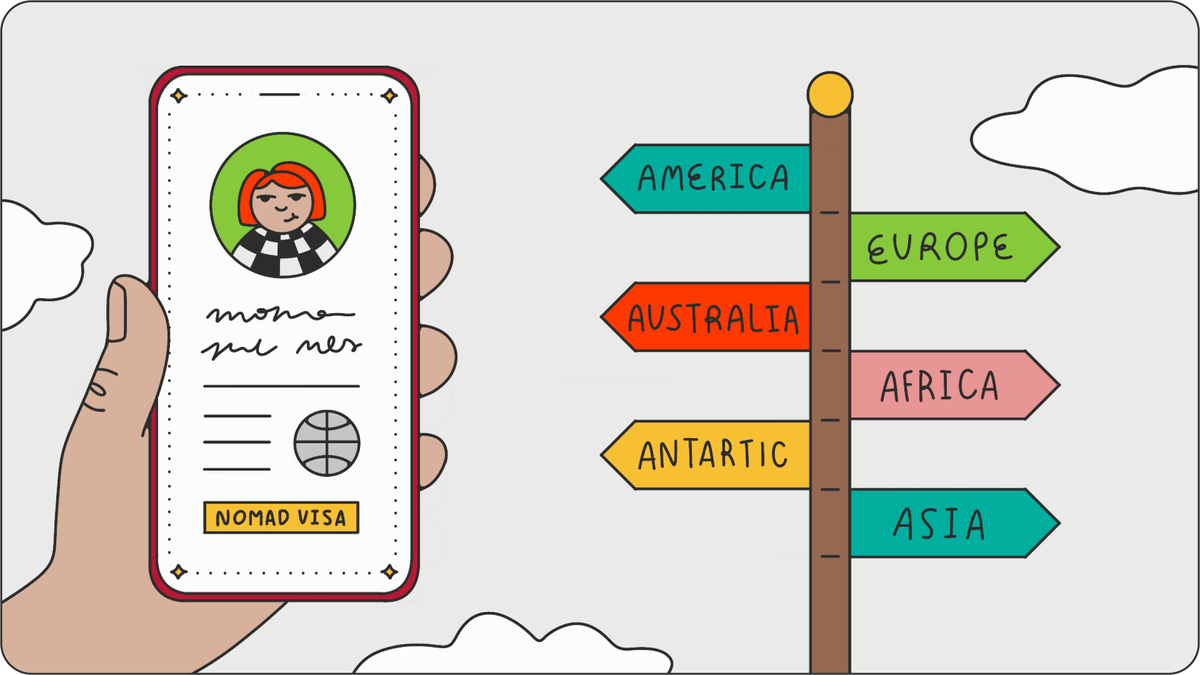Borders and Passport Power: Who Gets to Move Freely?
Investigate the inequalities of passport power, how borders shape mobility, and what it means to navigate a world where freedom of movement isn’t universal.

This post is part of an essay collection. You can buy the book version on Kindle or subscribe on Substack for new essays.
The majority of nomads come from advanced economies in Europe, North America and Oceania, which means they hold some of the world’s most powerful passports. Their lifestyle leverages an unjust reality: a person’s country of origin is what determines the restrictions placed on their movement. But nomads also represent a significant democratization of mobility rights, from an elite minority buying passports to a more diverse group of people having the opportunity to live borderless lives.
According to The Passport Index, a passport comparison website run by the investment firm Arton Capital, tourists from advanced economies are granted a visa exemption or visa-on-arrival in 70% of countries worldwide.69 There’s little practical difference between these two visa categories, and when people mention “tourist visas,” it’s usually arrangements like these they refer to. Tourist visas offer anywhere between seven and ninety days in a country, and a strong passport allows you to stay longer and renew more easily.
For the right passport-holders, tourist visas are granted with few questions, but they do come with requirements. Some countries ask for exit flights, while others want to see a confirmed accommodation booking for the length of a person’s stay. Providing these documents means making decisions about when you’re leaving, where you’re staying, and where you’re going next in advance, which, for nomads, would mean firm commitments (or accepting financial losses) ahead of time.
Tourist visas often dictate a person must leave after a certain timeframe, but there are fewer, if any, restrictions on how long they have to wait before returning. This has created a loophole that’s enabled a popular nomad border hack: visa runs. Since the beginning, nomads have found inventive ways to work within the rules, but not necessarily in the ways the governments that created those rules intended. A visa run is a short side-trip where nomads leave a country in order to re-enter and reset their immigration clock. With an EU passport, a nomad who wants to live in Thailand for six months might take a 30-day visa on arrival, extend it for 30 days locally, then spend a weekend in Malaysia, return to Thailand for another 60 days, spend a weekend in Indonesia, then return to Thailand for another 60 days. There are no specific rules against visa runs in most countries, but if you found yourself drinking in a bar with an immigration official, you probably wouldn’t bring it up.
The above-board alternative to a visa run is to obtain a work visa and residency permit, a process that might include starting a company in your country of origin and then applying for permission for that company to employ people in the country you want to visit. After that, you need to pay for a lawyer and accountant to ensure you’re complying with local regulations, and file taxes for at least two years, in a language you probably don’t understand. All this takes months, sometimes years, to set up, costs thousands of dollars, and requires ongoing maintenance. The authorities often require you to be in your home country when you apply, and it can take weeks or months for permission to be granted. Even then, the visas and permits come with conditions: spend a certain number of days in the country each year, for example, or park thousands of dollars in a local bank account until your visa expires. That’s a lot of hard work and expense just to try a place out for a few months..
So, why not design a new global mobility tool specifically for nomads? To those working in the remote economy of the mid-2010s, the need for something better was already clear: a purpose-built visa allowing temporary visitors the option to register with the authorities on clear terms, no exit flights or visa runs necessary.
It wouldn’t be long until a country set its sights on bringing this idea to life.
Read the next post:

References
Bergreen, Laurence. Marco Polo: From Venice to Xanadu, p.341. London: Quercus, 2009.
Enkhbold, Enerelt. “The Role of the Ortoq in the Mongol Empire in Forming Business Partnerships.” Central Asian Survey 38, no. 4 (October 2, 2019): 531–47. https://doi.org/10.1080/02634937.2019.1652799.
Juvaini, Ata-Malik. Genghis Khan: The History of the World Conqueror, p.29. Manchester: Manchester University Press, 1997.
Lloyd, Martin. The Passport: The History of Man’s Most Travelled Document. Phoenix Mill: Sutton, 2005.
Evans, Timohtyy. “YesterYear.” Notes & Queries, February 13, 2011. https://www.theguardian.com/notesandqueries/query/0,5753,-19838,00.html.
Refugees and Citizenship Canada Immigration. “History of Passports.” Education and awareness, April 10, 2014. https://www.canada.ca/en/immigration-refugees-citizenship/services/canadians/celebrate-being-canadian/teachers-corner/history-passports.html.
Zinkina, Julia et al. “The First ‘Golden Age’ of Globalization (1870–1914).” A Big History of Globalization : The Emergence of a Global World System, 195–224. Cham: Springer International Publishing, 2019. https://doi.org/10.1007/978-3-030-05707-7_11.
Keynes, John Maynard: The Economic Consequences of the Peace. New York: The Project Gutenberg, May 6, 2005. https://www.gutenberg.org/files/15776/15776-h/15776-h.htm.
The Statue of Liberty-Ellis Island Foundation, Inc. “Ellis Island.” Statue of Liberty & Ellis Island, February 4, 2020. https://www.statueofliberty.org/ellis-island/.
Quito, Anne. “The Design of Every Passport in the World Was Set at One 1920 Meeting.” Quartz, October 28, 2017. https://qz.com/1111001/passport-design-worldwide-was-first-standardized-by-the-league-of-nations-paris-conference-of-1920/.
Topol, Tom. “Passport Conferences & Territory Issues by the League of Nations.” passport-collector.com, May 7, 2018. https://www.passport-collector.com/league-of-nations-passport-conferences/.
League of Nations. “Passport Conference.” Geneva: League of Nations Publications, 1926. http://archive.org/details/1926-05-18-geneva-passport-conference.
League of Nations. “Passport Conference.” Geneva: League of Nations Publications, 1925. https://biblio-archive.unog.ch/Dateien/CouncilMSD/C-641-M-230-1925-VIII_EN.pdf.
Rosenberg, Matt. “Current World Population and Future Projections.” ThoughtCo, February 17, 2020. https://www.thoughtco.com/current-world-population-1435270.
Knisely, Sandra. “The 1920s Women Who Fought For the Right to Travel Under Their Own Names.” Atlas Obscura, March 27, 2017. http://www.atlasobscura.com/articles/us-passport-history-women.
Salter, Mark B. Rights of Passage: The Passport in International Relations. Boulder, Co: Lynne Rienner Publishers, 2003.
Reid, Sue. “The Tragic but Brutal Truth: They Are Not REAL Refugees!” Mail Online, May 28, 2016. https://www.dailymail.co.uk/news/article-3613603/The-tragic-brutal-truth-not-REAL-refugees-Despite-drowning-tragedy-thousands-economic-migrants-trying-reach-Europe.html.
“What Is a Refugee?” Phillip Adams on Late Night Live. ABC Radio National, November 2, 2016. https://www.abc.net.au/radionational/programs/latenightlive/what-is-a-refugee/7972298.
Policy Planning Staff. “Review of Current Trends: U.S. Foreign Policy.” Foreign Relations of the United States, 1948, General; the United Nations, February 24, 1948. https://history.state.gov/historicaldocuments/frus1948v01p2/d4.
Wolf, Martin. “Will the Nation-State Survive Globalization?” Foreign Affairs 80, no. 1 (2001): 178. https://doi.org/10.2307/20050051.
Ritzer, George. Globalization: The Essentials. Second Edition. Hoboken, New Jersey: Wiley-Blackwell, John Wiley & Sons, Ltd, 2019.
Levin, Alan et al. “9/11 Hijacking: Behind the Drastic Call to Ground Planes after Attack.” USA Today, September 6, 2021. https://eu.usatoday.com/in-depth/news/nation/2021/09/06/9-11-hijacking-behind-unprecedented-decision-ground-planes/5451142001.
Stuart, Tessa. “Border Wall, Muslim Ban, and Other Trump Initiatives Joe Biden Is Ending on Day One.” Rolling Stone, January 20, 2021. https://www.rollingstone.com/politics/politics-news/biden-executive-orders-day-one-1114790/.
Webber, Frances. “The Embedding of State Hostility: A Background Paper on the Windrush Scandal.” The Institute of Race Relations, November 19, 2018. https://irr.org.uk/app/uploads/2018/11/Embedding-State-hostility-v4.pdf.
Czaika, Mathias et al. “The Global Evolution of Travel Visa Regimes: The Global Evolution of Travel Visa Regimes.” Population and Development Review 44, no. 3 (September 2018): 589–622. https://doi.org/10.1111/padr.12166.
Grey, Eva. “A World First: Australia’s Plan for Advanced Biometric Airport Checks.” Airport Technology, May 14, 2017. https://www.airport-technology.com/analysis/featurea-world-first-australias-plan-for-advanced-biometric-airport-checks-5808560/.
United Nations. “‘Invisible’ Stateless People Could Miss out on COVID-19 Jabs, UNHCR Warns.” UN Press Office, June 22, 2021. https://news.un.org/en/story/2021/06/1094492.
Vink, Maarten et al. “MACIMIDE Global Expatriate Dual Citizenship Dataset.” Harvard Dataverse, V5 [2020]. https://macimide.maastrichtuniversity.nl/dual-cit-database/.
Timsit, Annabelle. “How Covid-19 Is Changing Citizenship by Investment.” Quartz, September 16, 2020. https://qz.com/1903746/how-covid-19-is-changing-citizenship-by-investment/.
Williams, Ollie. “The Wealthy Nigerians Buying Citizenship Overseas.” Al Jazeera, December 10, 2020. https://www.aljazeera.com/features/2020/12/10/wealthy-nigerians-buying-citizenship-overseas.
Passport Index. “Global Passport Power Rank 2022.” Passport Index - Global Mobility Intelligence, December 31, 2021. https://www.passportindex.org/byRank.php.
Heller, Nathan. “Estonia, the Digital Republic.” The New Yorker, December 11, 2017. https://www.newyorker.com/magazine/2017/12/18/estonia-the-digital-republic.
Jobbatical. “A Brief Summary of a Survey among - 1050 Current, Former, and Aspiring Digital Nomads.” jobbatical, February 18, 2018. https://drive.google.com/file/d/1gWf3Tay04wJ3YdIf9ylWv2uKiqPhlD9q/view?usp=sharing&usp=embed_facebook.
Johanson, Helise. “Digital Nomad Visa - Agenda Email,” February 21, 2018. https://docs.google.com/document/d/150t8g-eJ3Jb5UDLliAK8G159lvz-QWqLbrCgElwTE70/edit?usp=embed_facebook.
Spinks, Rosie. “Digital Nomads Can Soon ‘Make It Official’ with a New Visa from Estonia.” Quartz, February 27, 2018. https://qz.com/quartzy/1216964/estonia-is-launching-a-digital-nomad-visa/.
Schengen Visa Info. “Estonia Opens Applications for Digital Nomad Visa.” SchengenVisaInfo.com, August 5, 2020. https://www.schengenvisainfo.com/news/estonia-opens-applications-for-digital-nomad-visa/.
Visit Barbados. “Barbados Welcome Stamp.” Accessed June 17, 2022. https://www.visitbarbados.org/barbados-welcome-stamp.
Henley, Jon. “Thousands Apply to Be a Finn for 90 Days in Migration Scheme.” The Guardian, December 25, 2020. https://www.theguardian.com/world/2020/dec/25/thousands-apply-to-be-a-finn-for-90-days-in-migration-scheme.
APEC. “APEC Business Travel Card (ABTC).” APEC, April 2022. https://www.apec.org/groups/committee-on-trade-and-investment/business-mobility-group/abtc.

